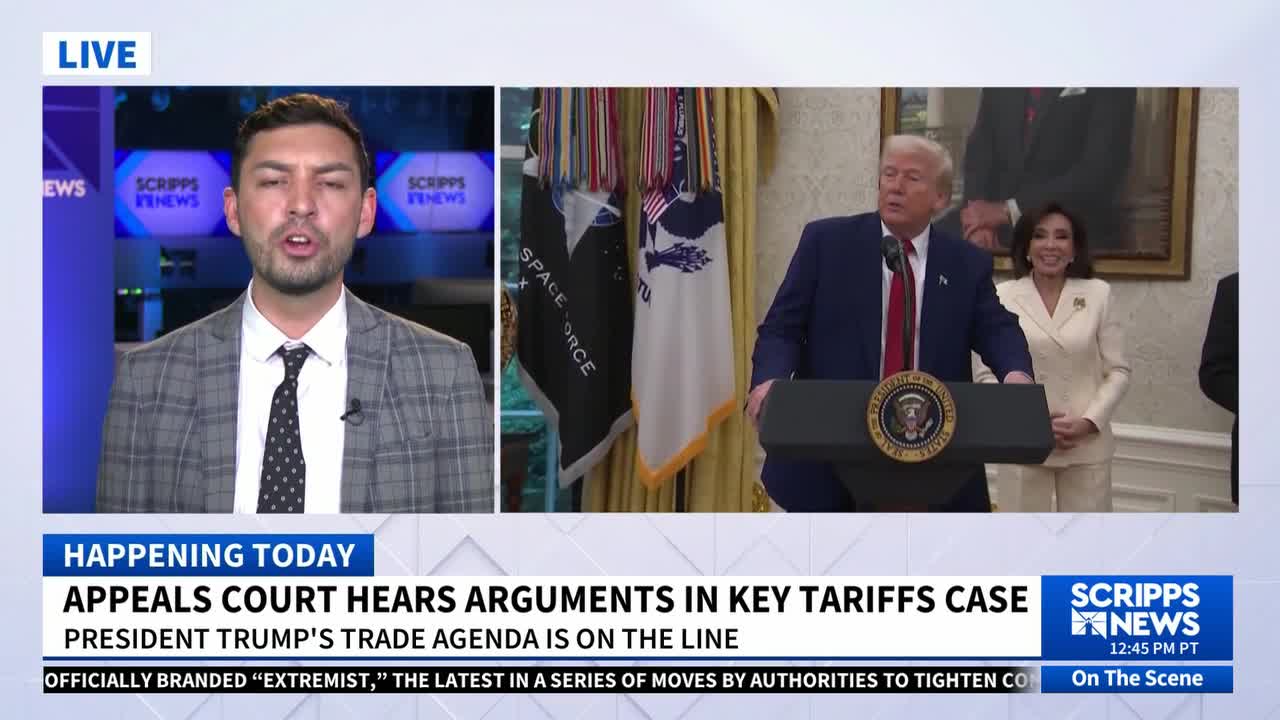A federal appeals court in Washington, D.C., heard arguments Thursday about the legality of President Donald Trump’s sweeping tariff agenda, just one day before higher reciprocal tariff rates on dozens of nations around the world were set to take effect once again.
The 11 justices on the U.S. Court of Appeals for the Federal Circuit had tough questions for attorneys on both sides of the dispute, though they appeared inclined to agree with the lower Court of International Trade’s ruling earlier this year that Trump overstepped his legal authority in imposing the tariffs.
A coalition of five small businesses that import goods from overseas as well as a group of 12 Democratic-led states filed challenges to the tariffs, with both cases consolidated upon appeal. The appeals court adjourned Thursday morning after roughly an hour-and-a-half of arguments without issuing a ruling, and gave no indication as to when their decision might come.
At issue in the case is whether the International Emergency Economic Powers Act (IEEPA), a 1977 law that gives the president broad powers to “regulate” international commerce during times of national emergency, specifically grants him the power to impose tariffs on foreign imports.
Many — but not all — of Trump’s many tariff announcements rely on IEEPA for legal justification. Attorneys in Thursday’s arguments highlighted the reciprocal tariffs, aimed at remedying trade imbalances with nations around the world, as well as those intended to curb the spread of fentanyl and other illicit opiates.
The Department of Justice, represented Thursday by Assistant Attorney General Brett Shumate, argued for broad presidential powers and suggested the authority to impose tariffs was tacitly implied in the law due to the context in which it was passed.
“Congress has long given the president broad discretion to deal with complex and evolving national emergencies in light of his preeminent role in foreign affairs and national security,” Shumate said in his opening remarks.
Lawyers representing the small business and Democratic states, conversely, noted the law makes no mention of tariffs — and suggested even if the justices were to agree with the Trump administration that it did impart a presidential emergency tariff power, the manner in which Trump is employing it should not be allowed to stand.
The Trump administration’s argument amounts to “a breathtaking claim to power that no president has asserted in 200 years, and the consequences are staggering,” argued Neal Katyal, the former solicitor general of the U.S. under President Barack Obama who’s now representing the small businesses in this case.
Even if the Justice Department can convince the justices that IEEPA gives the president powers to impose tariffs, it must also prove that the president is using them within the bounds of the law, which includes several limitations on the president’s emergency powers.
Specifically, the president’s actions must result from an emergency that is “unusual and extraordinary” — something the plaintiffs' lawyers argue is not the case, given that the trade imbalances Trump highlighted have persisted for decades.
The Department of Justice lawyers counter that while the trade deficits may be longstanding, their impacts on domestic manufacturing contribute to the “extraordinary” situation the president identified in his emergency declaration.
The Trump administration must also prove in court that Trump’s tariffs “deal with” such a threat — something critics of the tariff policy have argued is not the case, pointing, for example, to Trump’s newly-announced tariff on Brazil — a nation with which the U.S. maintains a trade surplus.
During a briefing with reporters following the hearing, the lawyers for the small businesses that sued suggested the case was tantamount to a referendum on the American system of separation of powers.
“Our founders fought a war about this stuff,” Katyal noted. “This was not some minor thing, going into the unsuspecting night. This was about as major as it gets.”
The lawyers declined to speculate as to when the justices might rule or how they’d do so, though they heaped praise on the officials for their preparation.
“They were incredibly well prepared. I mean, you heard justices referring to footnotes in pages of an opinion from 1975 for heaven's sake,” Katyal said. “As officers of the court, as people who care deeply about the Constitution, it's just gratifying to be part of that process.”





